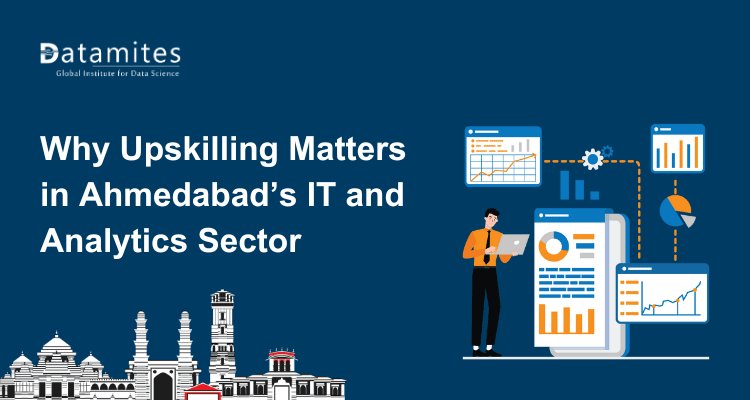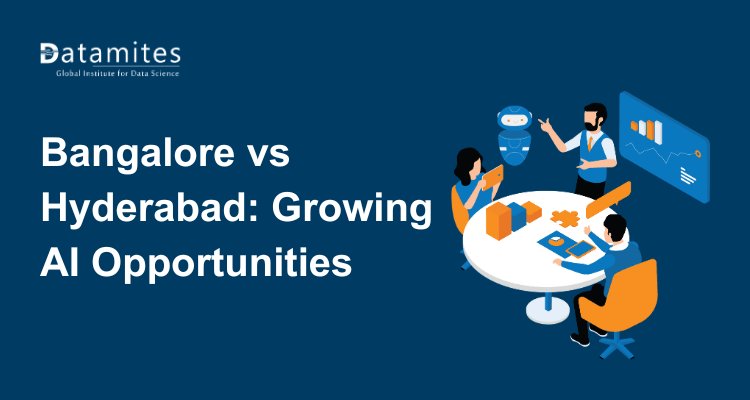How Much is the Data Science Course Fee in South Africa?

In South Africa, data science is rapidly gaining traction as organizations recognize the value of data-driven insights. In this article, we will cover the burgeoning opportunities and job growth in this field. With a growing economy and increasing digitization, there’s a rising demand for data scientists in South Africa across sectors such as finance, healthcare, e-commerce, and telecommunications.
According to a Fortune Business Insight report, the data science platform market is expected to experience significant growth in the forecast period, with a projected increase from $81.47 billion in 2022 to $484.17 billion by 2029, representing a Compound Annual Growth Rate (CAGR) of 29.0%.
The government’s focus on digital transformation initiatives further amplifies the scope for data professionals. As South Africa aims to foster innovation and analytics-driven decision-making, data science presents a promising career path with a wealth of opportunities for those with the right skills and expertise.
Defining Data Science: Unraveling the Essence of the Field
Data science is a multidisciplinary field that involves extracting insights and knowledge from vast amounts of data using statistical, computational, and analytical techniques. It encompasses data collection, cleaning, analysis, and interpretation to solve complex problems, make informed decisions, and predict future trends.
According to a Nova One Advisor report, the data science platform market was valued at approximately USD 97.6 billion in 2022, and it is anticipated to exceed USD 446.79 billion by 2032. This growth is projected to occur at a Compound Annual Growth Rate (CAGR) of 16.43% during the forecast period spanning from 2023 to 2032.
The demand for data scientists is continually rising across various industries, including finance, healthcare, technology, and more. With its wide-reaching applications and potential to drive innovation, data science offers a promising and expansive scope for professionals seeking rewarding careers in the data-driven world.
Refer these articles:
- How Data Science is Shaping the Healthcare Industry
- Data Science in E-Commerce
- Data Science for the Manufacturing Sector
Exploring Essential Tools in the Data Science Toolkit
The data science toolkit is a collection of essential tools and technologies that data scientists use to gather, analyze, visualize, and interpret data to derive actionable insights.
Here’s an overview of some of the essential data science tools and their key roles:
Programming Languages:
- Python: Python stands as the dominant programming language in the field of data science. It has a rich ecosystem of libraries and frameworks such as NumPy, pandas, scikit-learn, Matplotlib, and seaborn for data manipulation, analysis, machine learning, and visualization.
- Jupyter Notebook: Jupyter is a popular open-source platform that allows you to create and share documents that contain live code, equations, visualizations, and narrative text. It’s great for interactive data exploration and analysis.
Data Manipulation and Analysis:
- Pandas: Pandas, within the Python ecosystem, serves as a library designed for data manipulation and analysis. It provides data structures like DataFrames and Series, making it easy to clean, transform, and analyze data.
Data Visualization:
- Matplotlib: Matplotlib is a widely used Python library for creating static, animated, or interactive plots and visualizations.
- Seaborn: Seaborn is constructed as an extension of Matplotlib, offering an elevated, user-friendly interface for crafting visually appealing and informative statistical visuals.
- Plotly: Plotly is a library for creating interactive, web-based visualizations that can be used in dashboards and web applications.
Machine Learning and Deep Learning:
- Scikit-learn: Scikit-learn is a Python library for machine learning that provides tools for classification, regression, clustering, dimensionality reduction, and more.
- TensorFlow and PyTorch: These libraries are popular choices for deep learning and neural network development.
Data Storage and Databases:
- SQL: Structured Query Language is essential for working with relational databases, which are commonly used to store structured data.
- NoSQL Databases: For handling unstructured or semi-structured data, NoSQL databases like MongoDB, Cassandra, and Redis are popular choices.
- Big Data Technologies: Tools like Hadoop and Spark are used for processing and analyzing large-scale data.
Data Extraction and Web Scraping:
- Scrapy: A more advanced Python framework for web crawling and data extraction from websites.
Data Cleaning and Preprocessing:
- OpenRefine: An open-source tool for cleaning and transforming messy data.
- Data Wrangler: A tool for cleaning and transforming data interactively.
Cloud Computing Platforms:
- AWS, Google Cloud, Azure: These cloud platforms provide scalable infrastructure for data storage, processing, and deployment of machine learning models.
Unlocking Opportunities: Why Pursue a Data Science Career in South Africa
Pursuing a data science career in South Africa can be a rewarding and promising path for several reasons. As in many other parts of the world, data science is in high demand due to its potential to drive innovation and improve decision-making across various industries.
Here are some compelling reasons why you should consider a data science career in South Africa:
Growing Demand for Data Science: South African businesses and organizations are increasingly recognizing the value of data-driven insights. They are actively seeking data scientists to help them extract meaningful information from their data, optimize processes, and gain a competitive edge.
Diverse Industry Opportunities: Data science is applicable in a wide range of industries, including finance, healthcare, retail, agriculture, energy, and telecommunications. South Africa has a diverse economy, providing ample opportunities for data scientists to work in sectors that align with their interests and expertise.
Skill Shortage: Like many other countries, South Africa faces a shortage of skilled data scientists. As a result, data scientists are often in high demand and can command competitive salaries. This shortage creates excellent career prospects for those entering the field.
Education and Training: South Africa has reputable universities and institutions that offer data science programs and courses. These educational opportunities provide a strong foundation for aspiring data scientists to develop their skills and knowledge.
Startup Ecosystem: South Africa has a growing startup ecosystem, particularly in cities like Cape Town and Johannesburg. Startups often leverage data science to gain a competitive edge, creating opportunities for data scientists to work on innovative projects.
Career Growth: Data science is a rapidly evolving field, offering ongoing opportunities for professional development and career growth. As you gain experience, you can specialize in areas like machine learning, artificial intelligence, or big data analytics.
Read these articles:
- How Much is the Data Science Course Fee in USA?
- How Much is the Data Science Course Fee in UAE?
- How Much is the Data Science Course Fee in UK?
Exploring Income Opportunities: Trends in Data Scientist Salaries in South Africa
Exploring income opportunities and trends in data scientist salaries in South Africa can provide valuable insights for those interested in pursuing a career in this field.
Here are some key insights into data scientist salaries in South Africa:
Salary Range: Data scientist salaries in South Africa can vary widely depending on factors such as location, experience, education, and the industry. Entry-level data scientists can expect a lower salary, while those with several years of experience and specialized skills can command higher pay. The salary of a data scientist in Sri Lanka ranges from ZAR 732, 581 per year according to an Indeed report.
Location Matters: Just like in many other countries, location plays a significant role in salary variations. Cities like Johannesburg, Cape Town, and Pretoria tend to offer higher salaries compared to smaller towns or rural areas. This is often due to a higher cost of living in major cities.
Experience and Skills: Experienced data scientists with expertise in machine learning, deep learning, artificial intelligence, and big data technologies generally earn more. Continuous learning and staying up-to-date with the latest tools and technologies can contribute to salary growth.
Education: Advanced education, like pursuing a master’s or Ph.D. in a relevant field, can also impact salary. However, practical experience and skills often weigh heavily in salary negotiations.
Certifications: Obtaining certifications in data science or related fields (e.g., AWS Certified Machine Learning, Microsoft Certified Data Scientist) can enhance your earning potential.
Demand for Data Scientists: The demand for data scientists in South Africa has been on the rise, as more industries recognize the value of data-driven decision-making. This increased demand can put upward pressure on salaries.
Data scientists can discover attractive salary prospects in prominent urban centres within South Africa:
- The salary of a data scientist in Cape Town ranges from ZAR 89,652 per year according to a Glassdoor report.
- The salary of a data scientist in Johannesburg ranges from ZAR 596,763 per year according to a Glassdoor report.
Exploring the Costs of Data Science Courses in South Africa
The costs of data science courses in South Africa can vary significantly depending on several factors, including the institution offering the course, the course’s duration, and its level of specialization. Generally, data science course fees in South Africa range from ZAR 20,000 to ZAR 40,000 for short online courses or in-depth programs offered by specialized training providers.
It’s essential for aspiring data scientists to consider their budget, career goals, and the reputation of the institution when exploring the costs of data science courses in South Africa to make an informed decision about their investment in their education.
Navigating Your Path: Selecting the Right Data Science Course in South Africa
Selecting the right data science course in South Africa, or anywhere else for that matter, is a crucial decision that can significantly impact your career. Data science is a rapidly evolving field, and choosing the right course is essential to ensure you acquire the necessary skills and knowledge.
Here’s a step-by-step guide to help you navigate your path and make an informed decision:
Define Your Goals: Determine your career objectives and what you hope to achieve with a data science course. Are you looking to start a career in data science, enhance your current skills, or switch career paths? Clarifying your goals will guide your course selection.
Understand the Basics: Familiarize yourself with the core concepts of data science, such as data analysis, machine learning, statistics, and programming languages like Python and R. Having a foundational understanding will help you assess course offerings better.
Research Institutions: South Africa has several universities and institutions offering data science courses. Research these institutions to identify reputable ones known for their data science programs.
Accreditation and Recognition: Ensure that the institution and the specific course you’re interested in are accredited and recognized by relevant educational bodies. A recognized certification carries more weight in the job market.
Course Curriculum: Review the curriculum of the data science course. Check if it covers a broad range of topics, including data preprocessing, machine learning, data visualization, and real-world applications. A well-rounded curriculum is essential.
Instructor’s Credentials: Look into the instructors qualifications and industry experience. Experienced instructors who have worked on data science projects can provide valuable insights and practical knowledge.
Real-time projects: When choosing a data science training course in South Africa, consider programs that offer real-time projects as they provide hands-on experience and practical application of data science concepts, enhancing your skills and employability.
Resources and Facilities: Assess the resources and facilities available to students. A well-equipped library, access to relevant software and tools, and a supportive learning environment are crucial.
Internship Opportunities: When evaluating data science courses in South Africa, also look for programs that offer internship opportunities as they can provide valuable real-world experience and networking opportunities, helping you bridge the gap between theory and practical application.
Practical Experience: Practical experience is vital in data science. Check if the course includes hands-on projects, internships, or opportunities to work on real-world data problems.
Cost and Financial Aid: Evaluate the cost of the course and whether financial aid or scholarships are available. Factor in your budget and consider the return on investment (ROI) in terms of future career opportunities.
Career Guidance: When deciding on a data science course in South Africa, consider programs that provide career guidance services to help you chart a clear path towards your data science career goals, offering insights, resources, and support for your professional development.
Refer these articles:
- How Much is the Data Science Course Fee in Philippines?
- How Much is the Data Science Course Fee in Netherlands?
- How Much is the Data Science Course Fee in Canada?
Why DataMites for the best Data Science Training in South Africa?
DataMites is a renowned training institute, highly regarded for its extensive data science course in South Africa spanning over eight months, providing a totally immersive learning experience of 700 hours. This comprehensive course encompasses vital areas like data analytics, data engineering, artificial intelligence, machine learning, and deep learning. Importantly, DataMites program is accredited by IABAC, assuring students of a recognized certification upon successful completion.
The institute places a strong emphasis on industry relevance, ensuring that students acquire the most up-to-date skills and knowledge that align effectively with their desired career paths. The Certified Data Science Course in South Africa offered by DataMites presents an exceptional opportunity for individuals seeking in-depth and thorough learning in the data science field.
Several key factors contribute to DataMites stellar reputation for exceptional data science training in South Africa:
- Diverse Course Offerings: DataMites training programs cover a wide array of subjects, including certifications like Certified Data Scientist, Data Science for Managers, and Data Science Associate. Furthermore, foundational courses like the Data Science Foundation are available to help establish a solid knowledge base.
- Instructor Expertise: Assessing the qualifications and industry experience of DataMites instructors is crucial. Instructors with practical experience can offer invaluable insights and guidance to students.
- Practical Learning Focus: DataMites places a strong emphasis on practical, hands-on learning in South Africa. This approach equips students with practical skills and real-world experience, enhancing their employability.
- Internship Opportunities: Prospective students can inquire about internship opportunities or partnerships with local companies. Practical experience is essential in the field of data science, and an institute that can facilitate internships can be a valuable asset to career development.
- Online Training Mode: Interactive online data science training in South Africa offers engaging learning experiences. During the 120-hour live online sessions, participants have the opportunity to actively engage with experienced instructors and fellow students in real time, making learning more interactive and accessible.
- Certifications: DataMites offers top-notch Data Science training in South Africa, ensuring comprehensive knowledge and practical skills. They also focus on preparing students for data science certification in South Africa, significantly enhancing their career prospects and credibility in the field.
Certified Data Scientist (CDS) Program
How much is the DataMites data science course fee in South Africa?
DataMites is dedicated to providing top-tier education to aspiring data scientists at a reasonable cost, distinguishing it as a superb choice for students. The Certified Data Scientist Course Fees in South Africa is highly competitive, with fees ranging from ZAR 14,913 to ZAR 38,200 This pricing approach is designed to ensure that high-quality Data Science education is within reach for a wide range of learners. This affordability aspect makes DataMites an attractive option for individuals aspiring to build a career in Data Science in South Africa, without the burden of excessively high expenses.
Bottom Line:
Pursuing data science education in South Africa is a promising choice due to the growing demand for data professionals in various industries. The comprehensive courses offered by reputable institutions like DataMites equip students with essential skills.
The future scope for data science in South Africa is bright, with increasing opportunities in fields such as finance, healthcare, and technology. As the country continues to digitize, data scientists will play a pivotal role in driving innovation and decision-making. Therefore, investing in data science education in South Africa holds great potential for a rewarding career.
Complete guide to Git and GitHub
Data Science vs Data Analytics








